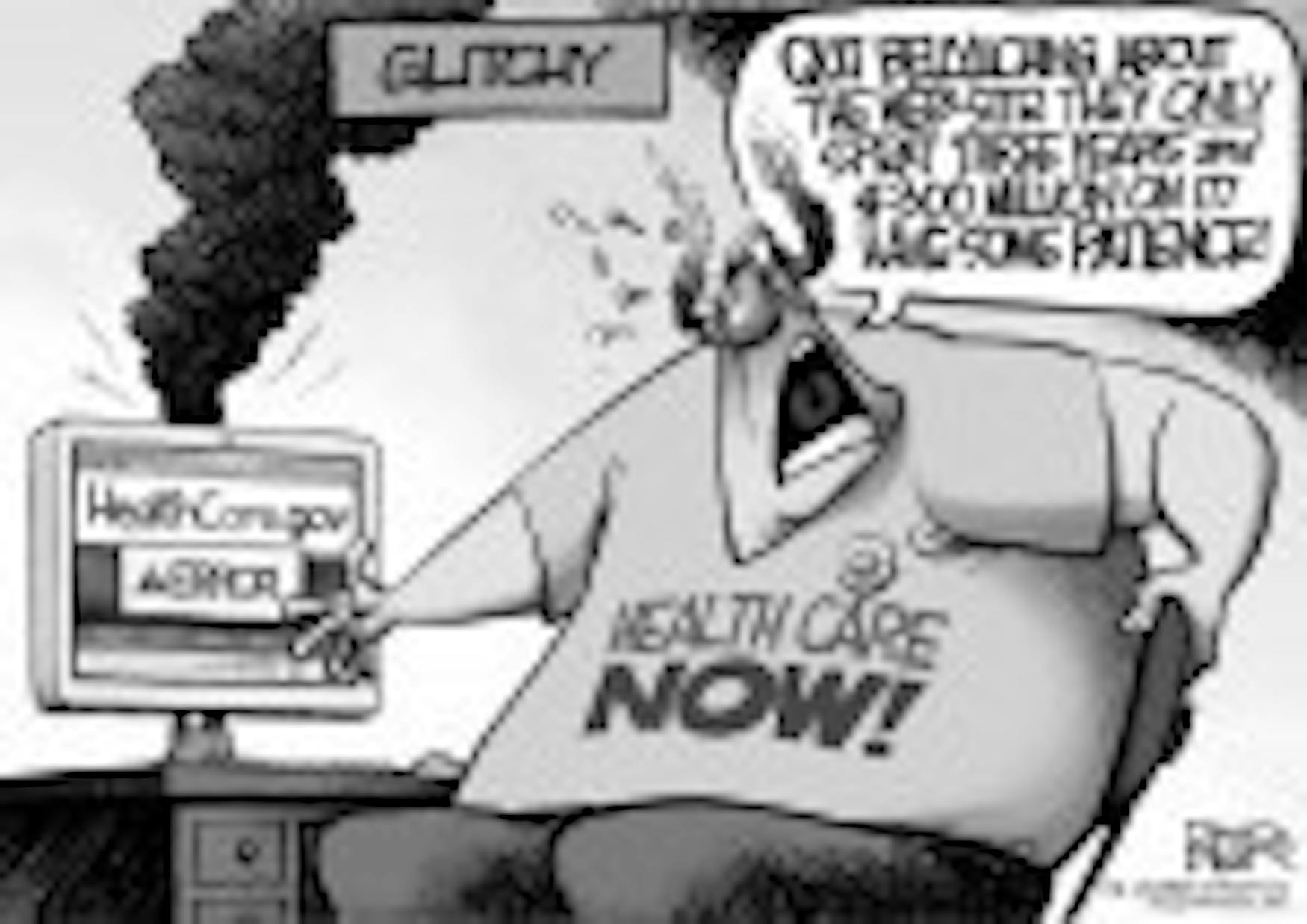Obamacare's high cost hurts Americans
Three years ago, President Barack Obama promised that the Patient Protection and Affordable Care Act would give every American access to the medical care they deserve. Since its imple-mentation, the plan unfortunately has not delivered. The execution of the health care exchange's website has been fraught with technological glitches. At the same time, people all over the country are losing access to their health plans despite Obama's promise that "if you like your plan, you can keep it." So why don't more Americans demand answers from the politicians who passed "Obamacare?"
After years of debate, Democrats rushed Obamacare through the Senate in the middle of the night without letting Republicans adequately voice their objections. The government granted itself control over one sixth of the United States economy, and left us with a barely functioning website which still lacks 40 percent of its intended content, and provides no protection to users from online hackers, as reported by Reuters on Nov. 20, 2013. Premiums have already skyrocketed for institutions like Bowie State University, where student health insurance costs catapulted from $100 to $1,800 a year, according to FOX News. Similar stories have unfolded in New Jersey, with the state's Association of State Colleges and Universities reporting that students at nine schools have seen health care costs triple. And most unfortunate of all, Forbes reports that around five million people will lose their insurance effective Jan. 1, 2014 because their plans are no longer viable under the Obamacare mandates.
While politicians try to save face and spin the disastrous enactment of Obamacare to fit a blame-someone-else narrative, the ramifications of the Affordable Care Act will keep coming. Medical institutions across the country are preparing for the impending storm of exorbitant costs from caring for those on Obamacare's federal exchanges. Many are choosing to not serve them. In an interview with Chris Wallace, Sen. Ted Cruz (R-Texas) noted that Texas Oncology, one of the best cancer centers in the state, recently announced that it will not participate in and offer services to those under Obamacare. If more health institutions decide to go down the same route as Texas Oncology, what will happen to President Obama's promise that "if you like your doctor, you can keep your doctor?" And what will happen when the one-year-delayed employer mandate, requiring employers with 50 or more full-time workers to provide health insurance for their employees, takes effect? In a country where more than 90 million Americans have employ-er-provided health insurance, could we see even more lost health coverage and immense consumer displeasure over high costs as employers drop employees from their healthcare plans onto the Obamacare exchanges? Only time will tell. But given the 57.2 percent average disapproval rate for the health care law, people are scared now.
The time is now for the United States to listen to conservatives who have offered alternative, free-market solutions to health care reform. Many conservatives in Congress have supported and pushed for market-oriented options that address the real reason behind high insurance costs: third-party payments from insurance companies. Essentially, insurance companies take consum-ers' money that is paid through premiums and distribute that money to providers of health care. This means that people often do not see or are not educated about costs dealing with medical care, which increases prices.
To remedy this problem, senators Cruz, Mike Lee (R-Utah) and Rand Paul (R-Kentucky) have advocated for expanding personal health savings accounts, which cover out-of-pocket medical costs. These accounts are tax-free and give buyers incentives to save more of their money for future uses concerning health care. These accounts have been popular among middle and lower-middle class Americans in the past, with eHealthInsurance.com detailing that 40 percent of health savings account enrollees made under $50,000 and 20 percent of enrollees made under $35,000 in 2004. With focused expansion, these percentages could be even higher.
The result of this policy is that more people will become aware of what they are paying during routine medical procedures, which means that their decisions about where to go for basic medical needs will be more prudent. As a result, costs decrease as competition in the market grows-a stark contrast from the exploding costs Americans are currently seeing under Obamacare.
These same politicians have also called for removing the restrictions imposed on buying insurance across state lines. To have an active, competitive market that is concerned about the pricing and quality of their services, we must have a 50-state marketplace for consumers to buy health insurance across state lines. In the internet age, there is no reason why a New Yorker shouldn't be able to buy a plan from Utah.
Finally, Cruz has called for delinking health insurance from employment by reforming the federal tax code, allowing workers to keep their plan if they decide to leave one job for another. That way, we can be certain that people can truly keep their health insurance.
All it takes to enact these fair, common-sense health care policies is bipartisanship from both Democrats and Republicans who oppose failed big-government policies dealing with health care. This approach has plagued both the current and previous presidential administrations. We can't afford to meddle with our health care system by implementing a malfunctioning law that fundamentally does not work. The lives of Americans depend on it.
*




Please note All comments are eligible for publication in The Justice.